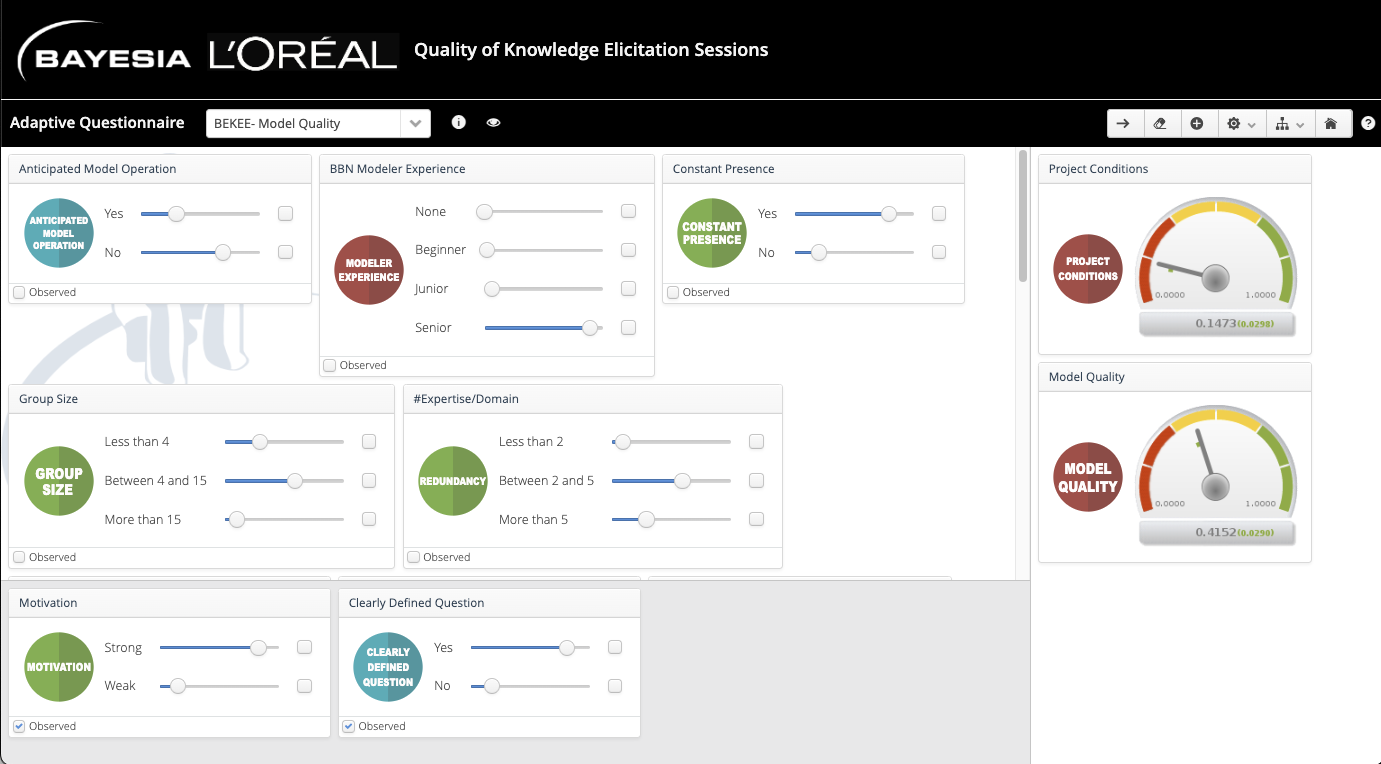Bayesia Expert Knowledge Elicitation Environment (BEKEE)
Overview
From Big Data to Data Gaps
"Big Data" is everywhere and hailed for its transformative potential, yet often equally feared for the challenges it presents. How do we store it, analyze it, make sense of it? These are real concerns, but in many ways, they are good problems to have. The far more pressing issue lies at the opposite end of the spectrum: the absence of data. In such cases, even the most sophisticated knowledge discovery algorithms fail—not because of their limitations, but because there is simply nothing to discover.
BayesiaLab: Bridging Data and Knowledge
For over two decades, BayesiaLab has advanced the science of learning from data through its powerful machine learning algorithms. Yet, BayesiaLab has also distinguished itself by addressing the other side of the equation: knowledge that cannot be captured in datasets. This includes the implicit and explicit knowledge residing in the minds of subject matter experts.
Encoding Expert Insight
Thanks to BayesiaLab's intuitive graphical interface, individual experts can easily encode their domain understanding into Bayesian networks. These models capture not only the structure of knowledge but, importantly, the causal relationships within a domain, something that few other modeling frameworks can do with such clarity and formality.
The Challenge of Group Expertise
However, eliciting knowledge from a group of experts is significantly more complex than working with a single individual. Traditional methods, such as brainstorming sessions, often suffer from cognitive and social biases that can distort the resulting models—especially when dealing with intricate or high-stakes domains.
Introducing BEKEE
To overcome these pitfalls, we developed the Bayesia Expert Knowledge Elicitation Environment (BEKEE). This web-based platform is designed to minimize groupthink and bias by eliciting independent assessments from each expert via interactive, iterative questionnaires. Inspired by the Delphi Method, originally developed by the RAND Corporation in the 1950s, BEKEE gathers diverse viewpoints without pressuring participants to conform.
Parallel Perspectives, Structured Comparison
Through BEKEE, each expert’s perspective is captured in a Bayesian network, creating multiple “parallel universes” of domain understanding. These perspectives can then be formally compared by a facilitator. Where significant differences emerge, a structured debate can be initiated to explore the roots of disagreement.
Toward a Unified Model
The process is typically iterative. Even if full consensus is not reached, BayesiaLab can synthesize all individual inputs into a unifying Bayesian network, a mathematically coherent and computable representation of the collective expert knowledge. This model goes far beyond a qualitative summary: it enables formal inference, supports decision analysis, and allows for the simulation of "what-if" scenarios.
From Expert Opinion to Computable Models
In essence, this approach allows us to build statistical models even in the absence of empirical data. While data-driven models remain ideal when large datasets are available, BEKEE provides the next best thing: a rigorous, formal framework for capturing and operationalizing what experts know.
Knowledge Elicitation Workflow
The following illustrations are based on a real-world knowledge elicitation process on COVID-19 symptoms:
Conceptual Overview of Workflow

Step 1: Qualitative Knowledge Modeling in Brainstorming Session

Step 2: Quantitative Knowledge Elicitation

Step 3: Deployment

Examples
-
Innovations in Knowledge Elicitation: A presentation introducing significant advances in structural knowledge elicitation methodology. Dr. Lionel Jouffe presents the latest innovations implemented in the BEKEE workflow, showcasing BayesiaLab's commitment to advancing expert knowledge capture techniques.
-
A Meta-Model for Predicting the Quality of Knowledge Elicitation Sessions: This research, presented at the BayesiaLab Conference, addresses a critical challenge in knowledge engineering: predicting the success of expert knowledge elicitation sessions. The presentation introduces a meta-model approach using Bayesian Networks to evaluate elicitation success probability, helping organizations optimize their knowledge capture processes.
- Expert knowledge representation through Bayesian Networks
- Integration of expert knowledge with empirical data
- Risk assessment in knowledge elicitation projects
- Meta-modeling for project success prediction

-
Harnessing Hellixia: Innovations in Bayesian Belief Network Construction: This webinar demonstrates practical applications of knowledge organization principles. While the webinar primarily focuses on Hellixia (BayesiaLab's AI assistant), it provides valuable insights into:
- Systematic identification of key domain concepts
- Application of the Independence of Causal Influence principle for model simplification
- Generation of semantic networks for domain comprehension
BEKEE-relevant content begins at 35:00 minutes into the presentation
-
Differential Diagnosis of COVID-19: This webinar introduces our collaborative knowledge elicitation project using BEKEE for the differential diagnosis of COVID-19 and influenza-like diseases.
-
Knowledge Elicitation & Geopolitical Reasoning Under Extreme Uncertainty with Bayesian Networks: In this workshop, we demonstrate how to elicit human knowledge for developing a high-dimensional computational model of an underlying problem domain in the form of a Bayesian network. This type of "Artificial Intelligence" allows us to reason formally—and quantitatively, despite the absence of numerical data—about the given issue.
